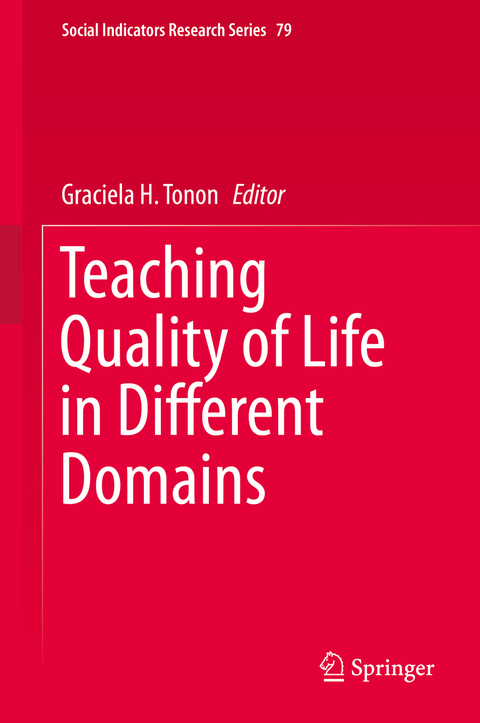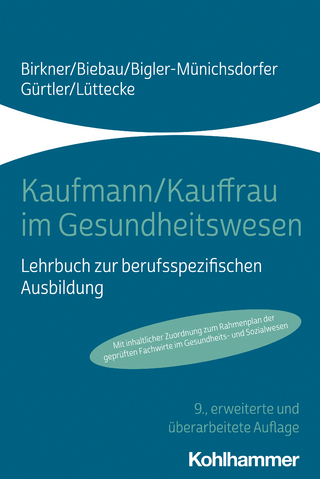
Teaching Quality of Life in Different Domains
Springer International Publishing (Verlag)
978-3-030-21550-7 (ISBN)
Graciela Tonon is Full Professor, Researcher and Director of the Master’s Program of Social Sciences and CICS-UP at the Universidad de Palermo, Argentina. She is the Director of UNICOM, the Faculty of Social Sciences of the Universidad Nacional de Lomas de Zamora. Graciela is Vice-president of Publications at the International Society for Quality of Life Studies and is the Series Editor of the International Handbooks of Quality of Life (Springer). She is also Secretary of the Human Development and Capability Association, and director and reviewer of research projects and doctoral theses at various universities in several countries. She has authored and edited books, book chapters, and scientific articles in Spanish and English in her areas of interest, including quality of life, research methodology, community, children, youth, human development and social work.
Chapter 1. The Importance of Teaching Quality of Life Theory and Methodology in Social Sciences Programs (Graciela Tonon).- Chapter 2. Well-Being and Quality of Life as Resources for Teaching Sociology (Tobia Fattore).- Chapter 3. Teaching Philosophy in Relation with Well-Being (Dan Weijers).- Chapter 4. Training Statisticians in the Field of Quality of Life: A New Challenge for the University System. The Case of QoLexity Master in Italy (Filomena Maggino).- Chapter 5. Nurturing Holistic Development in University Student Through Leadership Courses: The Hong Kong Experience (Daniel Shek).- Chapter 6. Teaching Quality of Life in Political Science (Takashi Inoguchi).- Chapter 7. Introducing Concepts of Well-Being and Quality of Life in Marketing Courses (M. Joseph Sirgy).- Chapter 8. Teaching Quality of Life in Economics from a Nonviolent Perspective (Jorge Guardiola).- Chapter 9. Teaching and Learning Quality of Life in Urban Studies (Javier Martinez).- Chapter 10. Teaching Quality of Life Studies in Impoverished or Low Socio-Economic Contexts (Shazly Savahl).- Chapter 11. Putting Gender on the Quality of Life Agenda (Liz Eckermann).- Chapter 12. How to Teach Quality of Life in Online Higher Education (Matías Popovsky and Graciela Tonon).- Chapter 13. Teaching Quality of Life and Well-Being in Public Health (Chelsea Wesner, Diana Feldhacker and Whitney Lucas-Molitor).- Chapter 14. Teaching Quality-of-Life and Well-Being Within the Context of Sport: The What, Why, How and For Whom! (Diane E. Mack, Philip M. Wilson, Caitlin Kelley, & Jennifer Mooradian).- Chapter 15. The Teaching of Quality of Life in International Relations (Lía Rodriguez de la Vega).- Chapter 16. Statistics, Knowledge, Policy: Putting the Quality back into Life (Jon Hall).- Chapter 17. The Capability Approach to Quality of Life: Some Ideas for Teaching in Social Science and Development (Paul Anand).
"A particular strength of this book for me is the inclusion of contributors and content from diverse parts of the world ... this volume successfully demonstrates the breadth and relevance of the concept of QoL ... . This book is a good introductory text and will be most useful for teachers and course designers looking to incorporate the teaching of QoL into their modules or courses. However, some of the chapters will also be relevant to policy-makers." (Lisa Wiebesiek, Journal of Human Development and Capabilities, Vol. 23 (2), 2022)
“A particular strength of this book for me is the inclusion of contributors and content from diverse parts of the world … this volume successfully demonstrates the breadth and relevance of the concept of QoL … . This book is a good introductory text and will be most useful for teachers and course designers looking to incorporate the teaching of QoL into their modules or courses. However, some of the chapters will also be relevant to policy-makers.” (Lisa Wiebesiek, Journal of Human Development and Capabilities, Vol. 23 (2), 2022)
| Erscheinungsdatum | 11.09.2019 |
|---|---|
| Reihe/Serie | Social Indicators Research Series |
| Zusatzinfo | XIV, 300 p. 26 illus. |
| Verlagsort | Cham |
| Sprache | englisch |
| Maße | 155 x 235 mm |
| Gewicht | 621 g |
| Themenwelt | Studium ► Querschnittsbereiche ► Prävention / Gesundheitsförderung |
| Sozialwissenschaften ► Pädagogik | |
| Sozialwissenschaften ► Soziologie ► Empirische Sozialforschung | |
| Schlagworte | Importance of Teaching Quality of Life • Quality of Life as Resource for Teaching Sociology • Teaching Philosophy in Relation with Well-Being • Teaching Quality of Life in Economics • Teaching Quality of Life in International Relation • Teaching Quality of Life in International Relations • Teaching Quality of Life in Online Higher Educatio • Teaching Quality of Life in Online Higher Education • Teaching Quality of Life in The Context of Sport • Teaching Quality of Life in Urban Studies • Training Statisticians in Quality of Life • Well-Being and Quality of Life in Marketing |
| ISBN-10 | 3-030-21550-4 / 3030215504 |
| ISBN-13 | 978-3-030-21550-7 / 9783030215507 |
| Zustand | Neuware |
| Haben Sie eine Frage zum Produkt? |
aus dem Bereich


